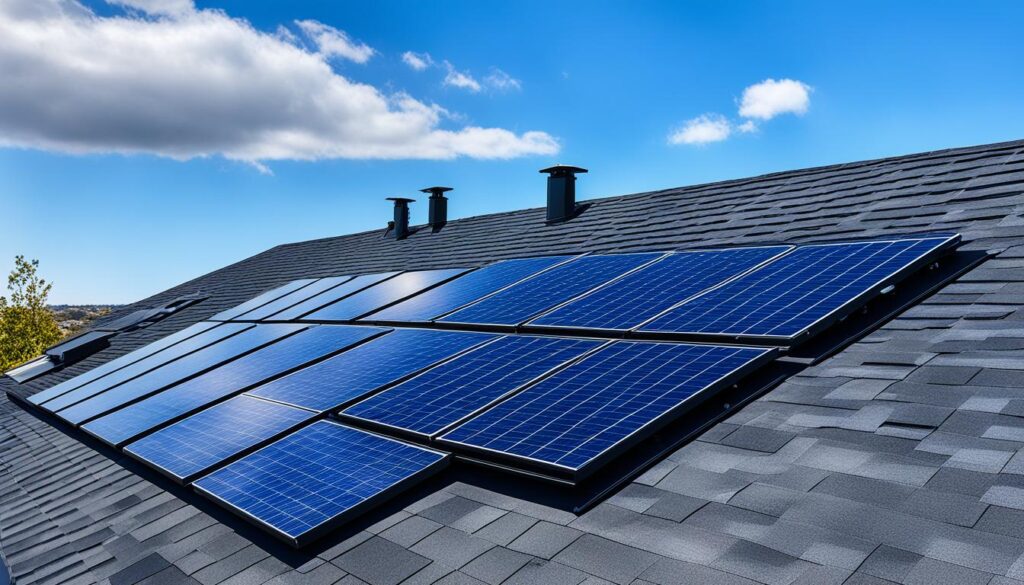Solar panel prices play a big role in the use of solar energy at home. A recent report said the typical home solar panel setup in the U.S. costs about $19,000. This is before any discounts. But, the cost varies due to how much energy you use, where you live, type of house, equipment, and brand. In California, the cost for a 6 kW solar system is approximately $16,080. It includes a tax credit of $4,824 and each watt costs about $2.68.
Since 2010, solar panel prices for homes have dropped by more than 60%. Today, most solar panels are 19% to 21% efficient, which is a lot better than in 2010. So, residential solar panels and 1kw solar panel setups are more within reach for homeowners now.
Key Takeaways
- The average cost of a residential solar panel installation in the United States is around $19,000 before incentives, with significant variation depending on factors like location, energy usage, and equipment type.
- Solar panel prices have dropped dramatically over the past decade, with efficiency ratings also increasing, making solar a more affordable and viable option for homeowners.
- The average cost of a 6 kW solar system in California is $16,080, with a tax credit value of $4,824 and an average cost per watt of $2.68.
- Residential solar panel prices have declined by over 60% since 2010, with most solar panels today having efficiency ratings between 19% and 21%.
- Homeowners have various strategies to reduce the cost of solar panels, including taking advantage of federal tax credits and local incentives, as well as comparing multiple solar quotes.
Understanding the Average Price of Solar Panel
Solar panels vary in cost due to many factors. These include how much electricity you use, the size of the system, and where you live. Your home’s specific details, the type of solar equipment, and your payment method also play a part.
Factors Impacting Solar Panel Price
How much electricity you use changes how many solar panels you need. If you have a big house or use a lot of energy, you’ll need more panels. The size of your system also affects the cost. Bigger systems cost more. Location is key, too. It affects how much energy your system can make, how much local workers charge, and permits.
The shape and size of your house and roof can also change the price you pay. More complex setups are pricier. The brand of solar equipment makes a big difference. High-end brands are more expensive than others. How you pay, whether upfront or over time, also influences the cost.
Solar Panel Cost Breakdown
The cost of the solar panels themselves is around one-fifth of the total. The rest covers costs like inverters, mounting equipment, and labor. It also includes soft costs like marketing and permitting.
Location and State-by-State Pricing Averages
Prices for solar panels vary by state. In the U.S., a 6 kW system costs from $13,980 in Georgia to $17,280 in D.C. Differences come from local labor costs, solar rebates, and electricity prices.
| State | Average Cost of 6 kW System | State Tax Credit | Average Cost per Watt |
|---|---|---|---|
| Georgia | $13,980 | $0 | $2.33 |
| District of Columbia | $17,280 | $1,500 | $2.88 |
Calculating the Price of a 1kw Solar Panel System
First, you need to decide the right solar system size for your home. This depends on how much energy you use and how sunny your area is. Then, you can figure out the size you need to power your home with solar energy.
Determining Your Energy Needs
In California, a typical home uses about 6,482 kWh of electricity yearly. A 5 kW solar system can usually cover this. But, homes with more energy use, for things like pool pumps or electric cars, might need a bigger system.
Estimating System Size and Cost
There’s a table that shows costs for solar systems in California, including tax credits. For instance, a 5 kW system costs around $12,550 without the credit and $8,785 with the credit. Larger systems cost more, as noted in another source.
| System Size | Average Cost Before Tax Credit | Average Cost After Tax Credit |
|---|---|---|
| 5 kW | $12,550 | $8,785 |
| 6 kW | $15,060 | $10,542 |
| 7 kW | $17,570 | $12,299 |
| 8 kW | $20,080 | $14,056 |
| 9 kW | $22,590 | $15,813 |
| 10 kW | $25,100 | $17,570 |

Strategies to Reduce the Cost of Solar Panels
Homeowners can lower the cost of a solar power system in several ways. Key factors include federal tax credits, local incentives, and comparing multiple solar quotes.
Federal Tax Credits and Local Incentives
The federal solar tax credit lets homeowners take 30% off their solar costs from what they owe in federal taxes. States like California offer extra benefits. These include no property tax on solar systems until 2025 and $150 per kWh in battery storage incentives. Using these incentives can reduce the initial solar installation cost.
Comparing Multiple Solar Quotes
When choosing a solar provider, getting quotes from different companies is crucial. It’s important to know the typical cost and variances in prices between brands. For example, in California, solar panel prices average $2.51 per watt. Yet, premium brands could raise the cost to over $4 per watt. Requesting a detailed quote breakdown helps homeowners spot deals without compromising on quality.
Financing Options for Solar Installations
There are several ways to finance solar panel installations. Cash buying saves on interest and maximizes incentives but needs a big initial payment. Solar loans offer a $0 down option and spread the cost over time. Leases and PPAs are other options to make solar power more available.

Conclusion
The article shows that the cost of installing solar panels in the US is about $19,000 on average. This cost varies due to location, how much energy is used, the system’s size, and equipment. Over the last ten years, solar panel prices have dropped. Also, the efficiency of solar panels has gone up. This has made solar energy more affordable for people who own homes.
To make solar panels more affordable, homeowners can get help from federal tax credits, local benefits, and rebates. It’s also wise to compare prices from different solar panel providers. Homeowners also have many ways to pay for solar panels. They can choose between paying in cash, using solar loans, leases, or power purchase agreements (PPAs). Each option has its benefits and drawbacks.
Overall, solar panels are now cheaper and more efficient. This, along with financial help and different payment options, makes solar energy a better choice. It’s good for homeowners who want to lower their energy bills and help the environment.
FAQ
What is the average cost of a residential solar panel installation in the United States?
The average cost for home solar panels in the U.S. is around $19,000. This is before any discounts. Yet, your total may change a lot. It depends on how much electricity you use, your location, and the size and type of your home.
What is the average cost of a 6 kW solar system in California?
In California, a 6 kW system costs about $16,080 on average. You can also get a tax break worth $4,824. The cost for each watt is roughly $2.68.
How have residential solar panel prices changed over time?
Since 2010, the cost of solar panels has dropped by more than 60%. Now, most panels are 19 to 21% efficient, which is 48% better than in 2010.
What factors can impact the cost of solar panels?
Many things can affect how much solar panels cost. This includes how much electricity you use and the size of the system you need. Your location and your home’s features also matter. The type of solar panels and how you pay for them make a difference too.
How does the average cost of solar panels vary across the United States?
The cost for solar panels changes from state to state. For a 6 kW system, it can be as low as $13,980 in Georgia. In the District of Columbia, it’s around $17,280. Here’s a table with costs for every state.
What components make up the total cost of a solar installation?
A solar installation’s price includes more than just the panels. You also pay for things like customer service, permits, and the company’s costs. Inverters, wiring, and the panels are part of the cost too. But the panels are less than 20% of the total cost.
What factors determine the size of a solar system needed for a home?
You need to think about how much energy you use and the sun where you live. In California, the average home needs 5 kW to meet its energy use. Yet, bigger homes or those with special equipment may need more.
How do federal and state incentives impact the cost of solar panels?
The U.S. government lets homeowners take 30% off their taxes for installing solar. California gives even more breaks, like no property tax on solar and a $150 bonus for every kWh of storage.
What should homeowners consider when comparing solar panel quotes?
Look at prices from different companies to find the best one. In California, the average price is $2.51 per watt. But, better brands like SunPower might cost over $4. Get a clear list of what each quote covers. Be careful of quotes that are very low or high. They might not offer good-quality parts.
What are the financing options available for home solar power systems?
You can pay for solar in different ways, like with cash, loans, leases, or PPAs. Buying with cash means no interest but a big first payment. Loans offer $0 down and easy payments, but you pay more due to interest.

